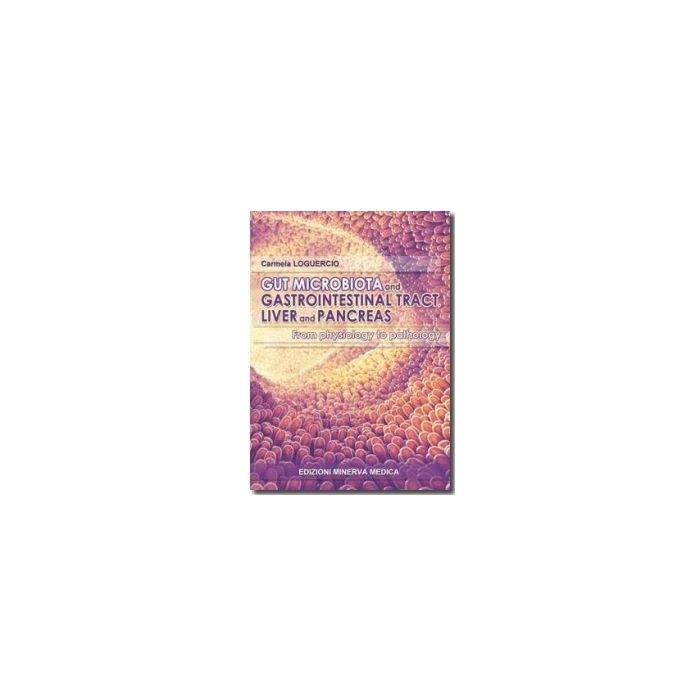Gut microbiota and gastrointestinal tract, liver and pancreas - From physiology to pathology

- ISBN/EAN
- 9788877119384
- Editore
- Minerva Medica
- Formato
- Brossura
- Anno
- 2018
- Pagine
- 136
Disponibile
29,75 €
35,00 €
The human organism is colonized by an enormous number of microbes, both on its surface and its inside. The set of microorganisms living in our gut is defined gut microbiota, which is considered now a functional organ of our body. Gut microbiota plays a key role in regulating both health and disease; its quantitative and/or qualitative variations, by altering the homeostasis between microbes and host, may lead to the onset of various diseases. Dis¬orders associated with the impairment of gut microbiota include functional gastrointestinal diseases, intestinal infectious diseases, inflammatory bowel disease (IBD), liver and pancreatic diseases, gastrointestinal malignancies, but also metabolic syndrome and diabetes and obesity, allergic diseases, autism, and others. The intestinal microbiota is considered a signaling hub that integrates environmental inputs, such as diet, with genetic and immune signals to affect the host’s metabolism, immunity, including autoimmunity and autoinflammation and elaborate networks linked to several organs. There is increasing interest on gut microbiota modulation as both a preventive strategy or as a therapeutic option in different gastrointestinal, hepatic and systemic diseases. The continuous use of words such as gastrointestinal microbiome, probiotics, prebiotics, fecal microbiota transplantation also through the media communications, suggests that this book, which is totally dedicated to the main relationships between gut echological system and diseases based on the most recent literature, could be a useful instrument both for research and for clinical practice in medicine and biology.
Maggiori Informazioni
| Autore | Loguercio Carmela |
|---|---|
| Editore | Minerva Medica |
| Anno | 2018 |
| Tipologia | Libro |
| Lingua | Inglese |
| Indice | The gut microbiota: its anatomy and physiology over a lifetime The development of gut microbiota Factors modulating microbiota health Physiological functions of the gut microbiota Conclusions Gut microbiota, obesity and metabolic disorders Gut microbiota in obese patients: a matter of diet Gut microbiota and metabolic disorders: pathogenesis Conclusions Gut microbiota and gastric disease Gastric microbiota: HP and non-HP bacteria and their interaction Gastric microbiota in the development of non-atrophic gastritis, intestinal metaplasia and gastric cancer Gastric microbiota and dyspepsia Exogenous interference on the gastric microbiota: proton pump inhibitors and diet Conclusions Gut microbiota and functional diseases of the gastrointestinal tract Introduction Esophageal microbiota and functional GI disorders Gastric microbiota and functional GI disorders Duodenal microbiota and functional GI disorders Bowel microbiota and functional GI disorders Conclusions Gut microbiota and inflammatory bowel disease: so far so gut! The pathogenesis of IBD and the discovery of the key role of microbiome Past perspective of the role of microbiota in IBD Current evidences about dysbiosis in IBD Diet as primary determinant for microbiome Clinical utility of medications affecting microbiome in IBD Towards a more robust manipulation of the microbiome in therapeutic armamentarium of IBD: probiotics, prebiotics, fecal microbiota transplantation and emerging dietary intervention Beyond or more on microbiome: emerging role of virus and yeast Conclusions Gut microbiota and the liver The gut microbiota in chronic liver diseases IP and liver damage Gut microbiota in chronic liver diseases Conclusions Gut microbiota and pancreatic diseases Role of microbiota in acute pancreatitis Role of microbiota in autoimmune pancreatitis Role of the gut microbiota in chronic pancreatitis Role of microbiota in pancreatic cancer Conclusions How to modulate gut microbiota: diet, preprobiotics or antibiotics? Diet Probiotics Prebiotics Antibiotics Conclusions Fecal microbiota transplantation: past, present and future perspectives Historical overview Pathophysiology of FMT Procedural aspects FMT for CDI FMT in IBD FMT in IBS and other functional bowel disorders FMT beyond gastroenterological disorders Future perspectives |
Questo libro è anche in:
